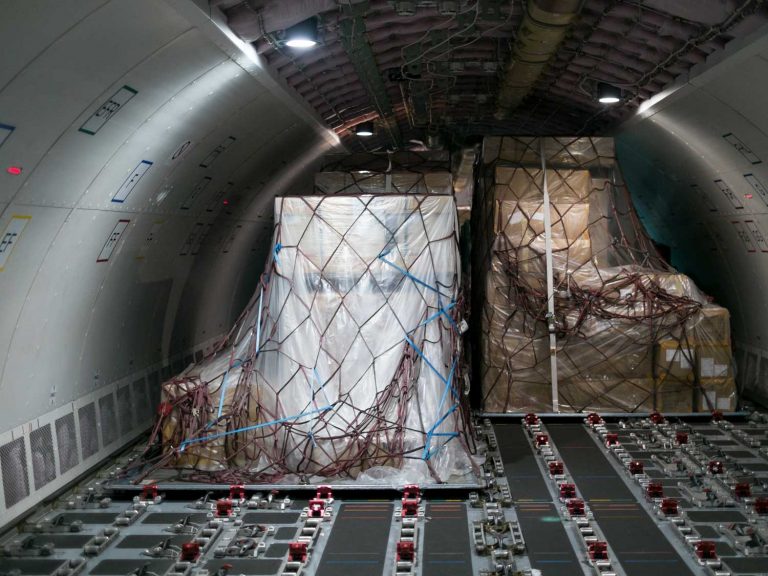
Date:
September Update: Air cargo under serious and sustained pressure – and it has only just begun….
Industry data released today shows that international demand for air cargo capacity versus a shortfall in supply pushed average global air cargo rates up 112% beyond their pre-COVID level, as lockdown in Vietnam and the closure of cargo handling terminals at Shanghai highlighted the fragility of Asia supply chains.
Dhaka in Bangladesh is also very challenging, for a multitude of reasons, from airport construction through to carriers cancelling large amounts of their schedules. That’s without a huge outpouring and swell of demand for air cargo throughout the world’s major markets – it’s not unique to the UK and Europe.
Even before the latest disruptions in Shanghai and Vietnam, air cargo capacity was tight due to fewer international passenger flights. With restricted travel globally, on every conceivable trade lane, very full flights are elevating rates significantly on prime intercontinental trade routes.
Shanghai’s Pudong International Airport (PVG) operations have been hit by a series of COVID cases that have resulted in passenger carriers cancelling services and diverting flights to other airports. In addition crew isolation requirements on arrival and reduced airport warehouse staffing continue to have an impact on physically loading and unloading arriving cargo freighters.
Shanghai’s problems contributed to a 10% drop in volumes from China to Europe in the last two weeks of August, while westbound capacity was reduced by 18%, with spot rates increasing by 20% in the last week of August.
Disruptions to cargo operations are expected to continue for the foreseeable future and while China Eastern Airlines (who have their own ground handling) has restored some services, it remains unknown when flight schedules will normalise, with limited air cargo capacity likely to further increase spot rates.
Stringent quarantine rules mean that only 1/3 of ground handling workforce is available at any time and air crew can only fly one flight every three weeks on long haul sectors where they have to disembark on arrival. Resulting in cancellations with an impact on cargo both in and out of the region.
Some cargo and charter operations have been suspended at Shanghai, Guangzhou and Beijing due to workforce issues and If nobody can handle the aircraft, or there are not enough crew, then airlines will have to suspend their schedules, until the situation improves and rules are changed.
While we are hopeful that the situation will improve in days, or weeks, we have to consider the impact of a prolonged disruption during the main peak season. Which is yet to come and looks to be challenging with ‘distressed sea freight’ and further disruption.
The biggest shippers (BCO’s as they would be known in the ocean freight market) have been accessing charter capacity, but that option is increasingly difficult, with scarce aircraft availability and insufficient handling capability, even at inland airports.
The situation from Singapore is no less challenging, with carriers diverting capacity from Europe to US services, with yields approaching levels achieved in the earliest PPE days of the pandemic. Or to put it in perspective, very much higher than on the European routes, resulting in airlines seeing greater returns on the American markets and further restricting capacity into the UK and Europe due to the limited uplift and capacity.
In southeast Asia manufacturing delays are adding to air freight demand, as shippers try to recoup lost lockdown time with air freight with Hanoi, Ho Chi Minh, Phnom Penh and Bangkok all facing high demand for air freight to Europe and the US.
Simply, the carriers have more demand than available capacity and are offering space to whoever pays the highest rates, mirroring the ocean freight dynamics of the last 18 months.
The air and sea freight markets from India are severely compromised, leaving many shippers to hold their shipments at their supplier’s warehouse, as the cost of freight exceeds their margin, while other importers fret about target deadline to meet their sales.
Imports into India from APAC are also disrupted with raw materials drastically delayed due to late arrival of vessels, which has increased production lead time, with late shipments being converted to air. Expectations are that this ‘peak’ could extend to mid-November.
In Bangladesh air cargo backlogs are growing daily, while in Sri Lanka there has been a sharp increase in demand out of Colombo, with Etihad cancelling its ‘Preighter’ services, Qatar pulling flights “for technical issues” and others also cutting flights. It’s not a normal environment for air freight in August as we slip into the traditional months of air freight peak.
But with demand remaining high and retailers wanting to move product as swiftly as possible, rates have rocketed over the past week, even with transit times increasing by four to five days.
The global air freight market is solid from a demand viewpoint, but the infrastructure that supports it is fragile and subject to major disruption, which simply drives rates up further. As evidenced by the closure of air cargo operations at Shanghai Pudong, the world’s third largest cargo airport, after a handful of COVID cases.
However, on the upside, Metro continue to be creative with our solutions and are always considering and operating every option of service available to satisfy and achieve deadlines based on customers’ requirements and expectations. Including the hybrid sea/air platforms through various hubs.
Innovation and delivering solutions is what we always do on all modes. With air freight we do it quicker and are agile to assist in every eventuality, today.
Please call Elliot Carlie or Grant Liddell NOW for further recommendations and advice.
As much visibility and planning in September that you can provide will ensure that we can in the last quarter of the year assist in achieving a tailored and bespoke platform to deliver your product to market – at the right time when it is needed.
Please engage now – a collaborative partnership is always how we achieve your goals.
